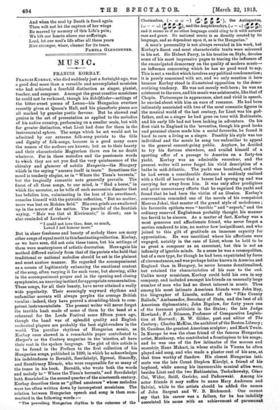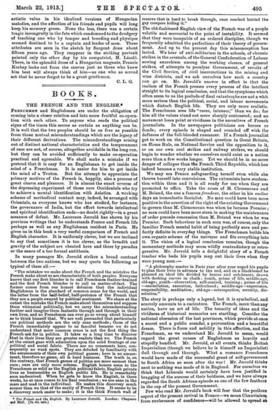MUSIC.
FRANCIS KORBAY.
FRANCIS KORBAY, who died suddenly just a fortnight ago, was a good deal more than a versatile and accomplished musician who had achieved a fourfold distinction as singer, pianist, teacher, and composer. Amongst the great creative musicians he could not be reckoned, though his Schilflieder—settings of the bitter-sweet poems of Lenau—his Hungarian overture recently given at Queen's Hall, and his pianoforte pieces are all marked by genuine poetic fervour. But he showed real genius in the art of presentation as applied to the melodies of his native country, performing on a smaller scale, but with far greater distinction, what Liszt had done for them in the instrumental sphere. The songs which he set would not be admitted by our extreme folk-song purists to the title and dignity of folk-songs, because in a good many cases the names of the authors are known; but as to their beauty and their characteristic Magyarism there can be no doubt whatever. For in these melodies and the passionate words to which they are set you find the very quintessence of the chivalry and glamour of nobilis Hungaria—the Hungary which in the saying "amuses itself in tears." Sometimes the mood is tenderly elegiac, as in " Where the Tisza's torrents," but the tragically romantic note generally prevails. The finest of all these songs, to our mind, is "Had a horse," in which the narrator, as he tells of each successive disaster that has befallen him, culminating in the loss of his sweetheart, consoles himself with the patriotic reflection, " But no matter, more was lost on Mohacs field." His own griefs are swallowed up in the sorrow of the nation. The parallel of the Scottish saying, " Mair was tint at Kirriemuir," is direct ; one is also reminded of Lovelace's
"I could not love thee, dear, so much, Loved I not honour more."
But in sheer freshness and beauty of melody there are many other songs of equal merit in this fascinatingcollection. Korbay, as we have seen, did not coin these tunes, but his settings of them were masterpieces of artistic decoration. Here again his method differed entirely from that of the purists who hold that traditional or national melodies should be set in the plainest and most austere manner. He regarded the accompaniment as a means of legitimately enhancing the emotional content of the song, often varying it for each verse, but showing, alike in the accompaniment proper and in the opening and closing symphonies, an unerring instinct for appropriate ornamentation. These songs, for all their beauty, bare never attained a really wide popularity. Their seemingly wayward rhythms and unfamiliar accents will always perplex the average British vocalist : indeed, they have proved a stumbling-block to com- petent instrumentalists. The present writer will never forget the terrible hash made of some of them by the band at a rehearsal for the Leeds Festival some fifteen years ago, though the band was of splendid quality and English orchestral players are probably the best sight-readers in the world. The peculiar rhythms of Hungarian music, as Korbay once showed in a remarkable paper contributed to Harper's or the Century magazine in the 'nineties, all have their root in the spoken language. The gist of this article is to be found in the Preface to the first collection of his Hungarian songs, published in 1890, in which he acknowledges his indebtedness to Bernith, Szerdahelyi, Egressi, Simonffy, and Szentirmay Elemer, who were responsible for so many of the tunes in his book. Bernith, who wrote both the words and melody to " Where the Tisza's torrents," and Szerdahelyi both flourished in the second quarter of the nineteenth century. Korbay describes them as "gifted amateurs" whose melodies were too often written down by incompetent musicians. The relation between Hungarian speech and song is then sum- marized in the following words :- •• The prevailing Hungarian rhythm IS the outcome of the Choriambus, ( — u —) • 0 Oil ••0 irs .1 the Antispastua, (u — — :•:), and the Amphibrachys, — •✓(P0 OP). 6° and it seems as if no other language could cling to it with natural ease and grace. No national music is as directly created by its language, and as dependent upon it as is the Hungarian."
A man's personality is not always revealed in his work, but Korbay's finest and most characteristic traits were mirrored in his art. Sir Hubert Parry, in his treatise on Style, devotes some of his most impressive pages to tracing the influence of the emancipated democracy on the quality of modern music— an influence concerning which he has no good word to say. This is not a verdict which involves any political condemnation ; it is purely concerned with art, and we only mention it here because Korbay stood in diametrical opposition to the demo- cratizing tendency. He was not merely well-born ; he was an aristocrat to the core, and his music was aristocratic, like that of Chopin. Picturesque in appearance, alert and vivid in speech, he carried about with him an aura of romance. He had been intimately associated with two of the most romantic figures in the musical world of the last century, for Liszt was his god- father, and as a singer he bad gone on tour with Rubinstein. and his early life had not been lacking in adventure. On his first visit to England in the 'seventies, though his good looks and personal charm made him a social favourite, be found it hard to earn a living as a singer. Possibly his style was too individual and the music he sang too unfamiliar to appeal to the general concert-going public. Anyhow, he decided to try his fortune elsewhere, and availed himself of a sporting offer of a passage to America on a forty-ton yacht. Korbay was an admirable raconteur, and the present writer Will never forget his vivid description of a bathe in mid-Atlantic. The yacht was becalmed, and when he Lad swum a considerable distance he suddenly realized with a thrill of horror that a breeze had sprung up and was carrying her away from him. It was only after prodigious and quite unnecessary efforts that he regained the yacht and found that he had been the victim of an illusion. Korbay's conversation reminded one of the novels of his compatriot Maurus Jokai, that master of the grand style of melodrama ; his favourite epithets were " terrible " and "superb," and the ordinary reserved Englishman probably thought his manner too fervid to be sincere. As a matter of fact, Korbay was a most generous and affectionate friend, who never forgot a service rendered to him, no matter how insignificant, and who joined to this gift of gratitude an immense capacity for appreciation. He was uncritical where his affections were engaged, notably in the case of Liszt, whom he held to be as great a composer as an executant, but this is not an infirmity of ignoble minds. In a sense be was a cosmopolitan, but of a rare type, for though he had been expatriated by force of circumstances, and was perhaps better known in America and England than in Hungary, he never became denationalized, but retained the characteristics of his race to the end. Unlike many musicians, Korbay could hold his own in any company, and included amongst his friends an unusually large number of men who had no direct interest in music. Thus among his most intimate American friends were John hay, the biographer of Lincoln, author of the " Pike County Ballads," Ambassador, Secretary of State, and the best of all American diplomatists ; John Bigelow, for forty years one of the foremost publicists in the States ; the late Judge Howland ; F. J. Stimson, Professor of Comparative Legisla- tion at Harvard ; R. W. Gilder, poet and editor of The Century ; Charles McKim, the architect of the Boston Library ; St. Gaudeus, the greatest American sculptor ; and Mark Twain. In Europe he was the close friend of the famous Hungarian artist, Munkacsy, who contributed a frontispiece to his songs; and he was one of the few intimates of the morose and eccentric Hans Makart, in whose studio in Vienna he often played and sang, and who made a plaster cast of his arm, at that time worthy of Sandow. His closest Hungarian inti- mate was the late Count Stephen Kerolyi, a friend of his boyhood, while among his innumerable musical allies were, besides Liszt and the two Rubinsteins, Tschaikowsky, Cesar Cui, Widor, Seidl, Gericke, and Paderewski. Among his actor friends it may suffice to name Mary Anderson and Salvini, while to the artists should be added. the names of John Sargent and W. B. Richmond. One cannot say that his career was a failure, for he has indelibly associated his name with an achievement of paramount
artistic value in his idealized versions of Hungarian melodies, and the affection of his friends and pupils will long keep his memory green. None the less, there was a certain tragic incongruity in the fate which condemned to the drudgery of teaching one who by temper and breeding and physique seemed destined to be a captain and leader of men. These attributes are seen in the sketch by Sargent done about fifteen years ago. They reappear in the striking portrait painted only the other day by his compatriot, M. Iisz16. There, in the splendid dress of a Hungarian magnate, Francis Korbay looks out from the canvas just as those who knew him best will always think of him—as one who so served art that he never forgot to be a great gentleman.
C. L. G.















































 Previous page
Previous page